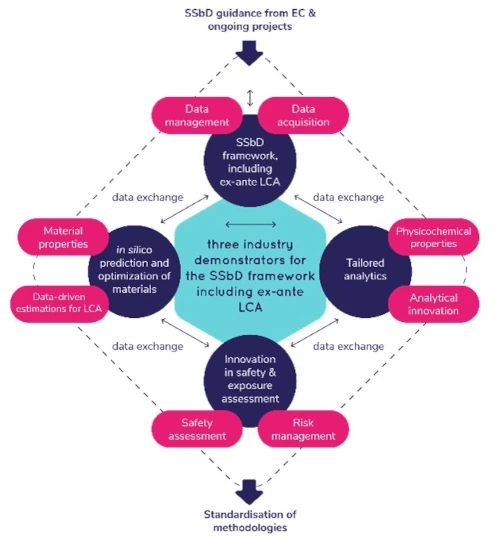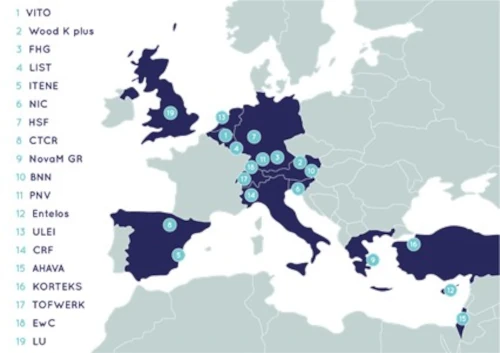Safe and Sustainable by Design framework for the next generation of Chemicals and Materials – SSbD4CheM
Project goals & contents:
The SSbD4CheM project, funded under HORIZON-CL4-2023 RESILIENCE 01-21, brings together stakeholders from industry, government, academia and civil society to develop and promote safe and sustainable product and process design. The joint project work is based on three case studies. SSbD4CheM aims to achieve the EU’s strategic goals for digital, fundamental and emerging technologies, sectors and value chains. This is achieved through a comprehensive framework for Safe and Sustainable by Design (SSbD). It uses new science-based approaches to identify and manage potential hazards and risks, as well as innovative technologies to support the development of safer and more sustainable products and processes.
SSbD4CheM methods include:
The SSbD framework for developing the next generation of chemicals and materials includes the following case studies:
- Renewable composites in the automotive value chain
- PFAS-free coatings for textiles and cellulose nanofibres
- Additives in cosmetics to replace plastic microparticles
- Development of efficient hazard screening tools for alternative assessment of next-generation chemicals/materials/products. Combinations of in silico tools and multi-criteria analyses are applied.
- Advanced exploratory ex-ante LCA methods, supported by molecular and data-driven modelling, to fill data gaps for (novel) materials and chemicals.
- Integration of methods for characterising chemicals/(nano)materials to assess the environmental safety of products and quantify emissions to support occupational and consumer safety limits.
- Development of alternative in vitro models as part of new methods (NAMs) for appropriate exposure scenarios.
- Harmonisation and validation of analytical and toxicological methods for submission to regulatory and standardisation bodies as a contribution to the development of new standards and to facilitate market acceptance.
The SSbD4CheM team consists of 19 partners (universities, research centres, SMEs) spread across 14 countries. The partners come from the following EU countries: Austria, Belgium, Cyprus, Germany, Greece, Israel, Italy, Luxembourg, Slovenia, Spain, Switzerland, the Netherlands, Turkey and the United Kingdom. All partners actively contribute to the project and ensure that the ideas and project results are communicated to the general public.


Project coordinator:
VITO Belgium
Project lead:
DIin Ivana Burzic
Project partners:
KOMPETENZZENTRUM HOLZ GMBH, FRAUNHOFER GESELLSCHAFT ZUR FORDERUNG DER ANGEWANDTEN FORSCHUNG EV, LUXEMBOURG INSTITUTE OF SCIENCE AND TECHNOLOGY, INSTITUTO TECNOLOGICO DEL EMBALAJE, TRANSPORTE Y LOGISTICA, KEMIJSKI INSTITUT, HOCHSCHULEN FRESENIUS GEMEINNUTZIGE RAGERGESELLSCHAFT MBH, ASOCIACION PARA LA PROMOCION, INVESTIGACION, DESARROLLO E INNOVACION TECNOLOGICA DE LA INDUSTRIA DEL CALZADO Y CONEXAS DE LA RIOJA, NOVAMECHANICS MONOPROSOPI IKE, BIONANONET FORSCHUNGSGESELLSCHAFT MBH, POSTNOVA ANALYTICS GMBH, ENTELOS INSTITUTE LTD, UNIVERSITEIT LEIDEN, CENTRO RICERCHE FIAT SCPA, AHAVA DEAD SEA LABORATORIES LTD, KORTEKS MENSUCAT SANAYI VE TICARET ANONIM SIRKETI, TOFWERK AG, EDELWEISS CONNECT GMBH, LOUGHBOROUGH UNIVERSITY
Project periode:
January 2024 - December 2027
Research programme / Project ID:
HORIZON-CL4-2023-RESILIENCE-01-21 - Innovative methods for assessing the safety and sustainability of chemicals and materials / Grant No 101138475
Funding:
The project is funded by the EU programme ‘Horizon 2023 European Union Funding for Research & Innovation’.
